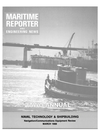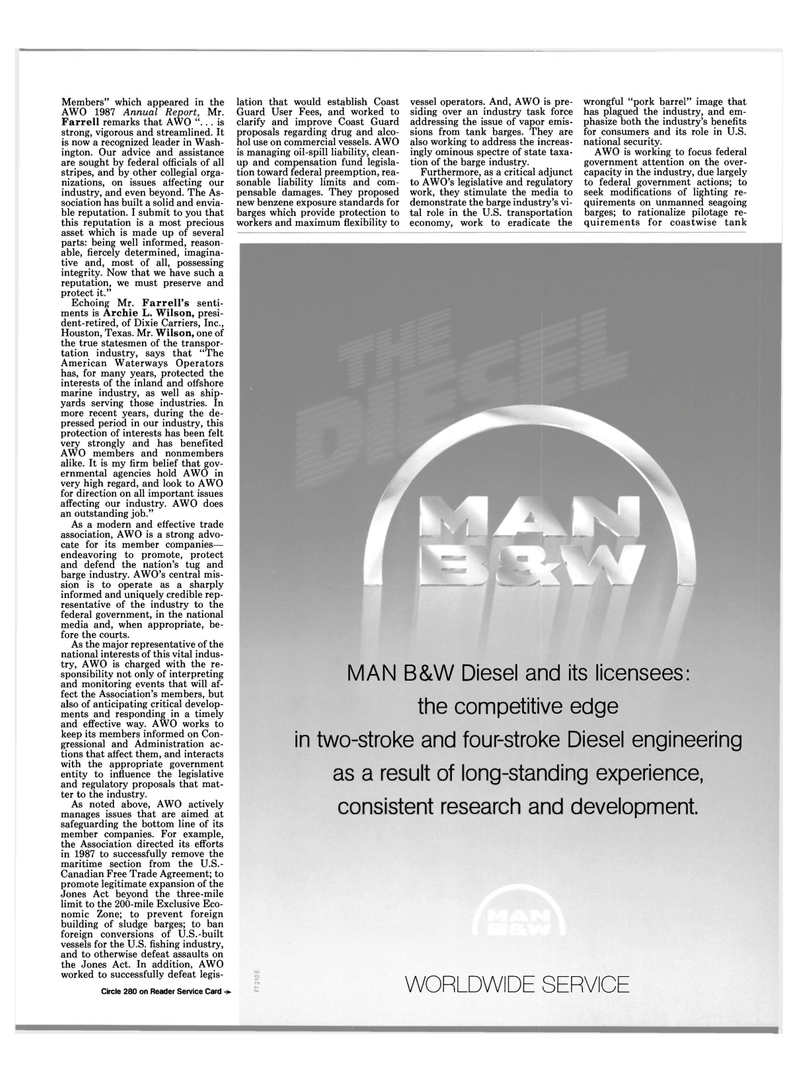
Page 13: of Maritime Reporter Magazine (March 1988)
Read this page in Pdf, Flash or Html5 edition of March 1988 Maritime Reporter Magazine
Members" which appeared in the
AWO 1987 Annual Report, Mr.
Farrell remarks that AWO ".. . is strong, vigorous and streamlined. It is now a recognized leader in Wash- ington. Our advice and assistance are sought by federal officials of all stripes, and by other collegial orga- nizations, on issues affecting our industry, and even beyond. The As- sociation has built a solid and envia- ble reputation. I submit to you that this reputation is a most precious asset which is made up of several parts: being well informed, reason- able, fiercely determined, imagina- tive and, most of all, possessing integrity. Now that we have such a reputation, we must preserve and protect it."
Echoing Mr. Farrell's senti- ments is Archie L. Wilson, presi- dent-retired, of Dixie Carriers, Inc.,
Houston, Texas. Mr. Wilson, one of the true statesmen of the transpor- tation industry, says that "The
American Waterways Operators has, for many years, protected the interests of the inland and offshore marine industry, as well as ship- yards serving those industries. In more recent years, during the de- pressed period in our industry, this protection of interests has been felt very strongly and has benefited
AWO members and nonmembers alike. It is my firm belief that gov- ernmental agencies hold AWO in very high regard, and look to AWO for direction on all important issues affecting our industry. AWO does an outstanding job."
As a modern and effective trade association, AWO is a strong advo- cate for its member companies— endeavoring to promote, protect and defend the nation's tug and barge industry. AWO's central mis- sion is to operate as a sharply informed and uniquely credible rep- resentative of the industry to the federal government, in the national media and, when appropriate, be- fore the courts.
As the major representative of the national interests of this vital indus- try, AWO is charged with the re- sponsibility not only of interpreting and monitoring events that will af- fect the Association's members, but also of anticipating critical develop- ments and responding in a timely and effective way. AWO works to keep its members informed on Con- gressional and Administration ac- tions that affect them, and interacts with the appropriate government entity to influence the legislative and regulatory proposals that mat- ter to the industry.
As noted above, AWO actively manages issues that are aimed at safeguarding the bottom line of its member companies. For example, the Association directed its efforts in 1987 to successfully remove the maritime section from the U.S.-
Canadian Free Trade Agreement; to promote legitimate expansion of the
Jones Act beyond the three-mile limit to the 200-mile Exclusive Eco- nomic Zone; to prevent foreign building of sludge barges; to ban foreign conversions of U.S.-built vessels for the U.S. fishing industry, and to otherwise defeat assaults on the Jones Act. In addition, AWO worked to successfully defeat legis-
Circle 280 on Reader Service Card -> lation that would establish Coast
Guard User Fees, and worked to clarify and improve Coast Guard proposals regarding drug and alco- hol use on commercial vessels. AWO is managing oil-spill liability, clean- up and compensation fund legisla- tion toward federal preemption, rea- sonable liability limits and com- pensable damages. They proposed new benzene exposure standards for barges which provide protection to workers and maximum flexibility to vessel operators. And, AWO is pre- siding over an industry task force addressing the issue of vapor emis- sions from tank barges. They are also working to address the increas- ingly ominous spectre of state taxa- tion of the barge industry.
Furthermore, as a critical adjunct to AWO's legislative and regulatory work, they stimulate the media to demonstrate the barge industry's vi- tal role in the U.S. transportation economy, work to eradicate the wrongful "pork barrel" image that has plagued the industry, and em- phasize both the industry's benefits for consumers and its role in U.S. national security.
AWO is working to focus federal government attention on the over- capacity in the industry, due largely to federal government actions; to seek modifications of lighting re- quirements on unmanned seagoing barges; to rationalize pilotage re- quirements for coastwise tank
MAN B&W Diesel and its licensees: the competitive edge in two-stroke and four-stroke Diesel engineering as a result of long-standing experience, consistent research and development.
WORLDWIDE SERVICE

 12
12

 14
14
